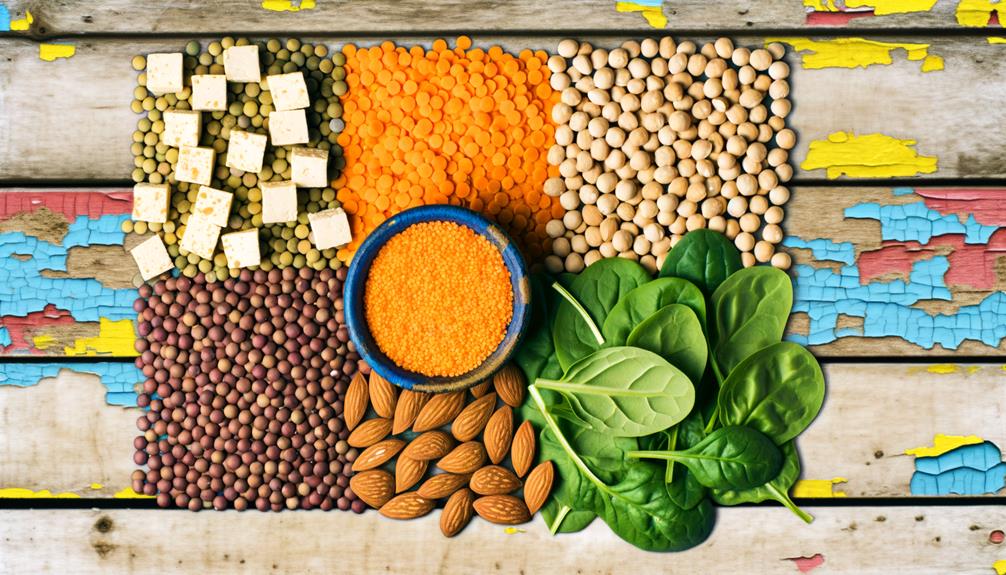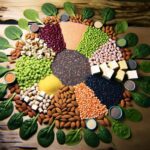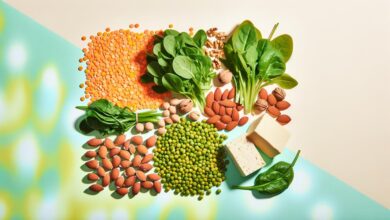Navigating the world of plant-based proteins can be like finding your way through a dense forest—intimidating at first, but rich with hidden treasures once you know where to look. As you pursue a vegan lifestyle, you’re mindful of the cultural shift towards sustainable eating, and it’s clear that maintaining a health-conscious diet doesn’t mean breaking the bank. You’re aware that essential nutrients, particularly protein, are abundant in a variety of plant-based sources. Consider lentils, for instance, a powerhouse of nutrition that won’t strain your wallet. Yet, the question looms: how can you incorporate these proteins into your daily meals in a way that’s both satisfying and nutritionally balanced? Stay with this thought, as you’re about to uncover some of the most accessible and versatile options that will not only support your health but also align with your compassionate food choices.
Key Takeaways
- Lentils, tofu, chickpeas, and tempeh are affordable sources of protein for vegans.
- These plant-based protein sources offer a variety of nutrients, including essential amino acids, fiber, iron, and folate.
- Incorporating lentils, tofu, chickpeas, and tempeh into meals supports a health-conscious and compassionate lifestyle.
- Choosing these affordable plant-based protein sources contributes to a sustainable and environmentally friendly food culture.
Budget-Friendly Lentils
Pack a protein punch without pinching pennies by embracing lentils, an economical and versatile staple in vegan diets. These tiny legumes are not just a good source of protein; they’re a powerhouse, offering about 23 grams of protein per 100 grams. As you nurture your health and the well-being of those you serve, consider the humble lentil—a beacon of plant protein that ensures you meet your daily protein needs affordably.
Lentils can be the high protein hero of any meal, transforming soups, stews, tacos, and salads into nutrient-dense feasts. Their adaptability makes them a cherished ingredient in culturally diverse dishes, allowing you to explore a world of flavors while providing essential nourishment. Whether you opt for the quick-cooking red split lentils or the robust green lentils, each variety brings its unique texture and taste to the table.
In serving others, you understand the importance of accessibility and sustainability. Lentils stand out as affordable sources of protein that support a health-conscious lifestyle without imposing financial strain. By incorporating lentils into your recipes, you’re not only enriching meals with essential nutrients but also making a compassionate choice that aligns with a plant-based philosophy. Your protein intake is vital, and lentils ensure it’s well taken care of.
Nutritional Powerhouse: Tofu
Step into the world of tofu, an affordable vegan marvel that delivers 11 grams of protein per 100 grams, fortifying your plant-based diet with a vital nutrient punch. As a cornerstone of vegan protein sources, tofu’s versatility makes it an essential addition to your culinary repertoire.
Here’s why tofu stands out as a nutritional champion:
- Complete Protein: Tofu contains all nine essential amino acids, making it a complete source of protein, which is crucial for muscle repair and overall health.
- Texture Versatility: With the ability to mimic the texture of meat, tofu can be adapted to countless dishes, satisfying diverse palates and dietary needs.
- Flavor Absorption: Tofu soaks up flavors from spices and marinades, ensuring that your meals are not just nutritious but also full of taste.
- Soy Protein Benefits: As a soy protein, tofu supports heart health and may contribute to lower cholesterol levels, reinforcing its position as a Plant-Based Protein powerhouse.
When you’re getting enough protein from sources like tofu, you’re not just nourishing your body; you’re also taking a step towards a more compassionate, sustainable way of living. Embrace tofu as an economical, health-conscious choice to empower your vegan journey.
Versatile Chickpeas
While tofu is a staple in the plant-based realm, chickpeas offer another protein-rich alternative that’s both nutritious and adaptable to a variety of dishes. As a cornerstone of vegetarian protein, these beans are extremely valuable in plant-based diets. With a high amount of protein per cup, chickpeas are not just good sources of nutrition; they’re a canvas for culinary creativity, from hearty curries to refreshing salads.
Let’s consider the following table to appreciate their versatility and nutritional profile:
| Preparation | Protein Content | Serving Suggestions |
|---|---|---|
| Boiled | ~15g per cup | Salads, Grain Bowls |
| Hummus | ~19g per 100g | Dip, Spread |
| Roasted | Varied | Snacks |
| Burger Patty | ~19g per 100g | Sandwiches, Wraps |
Embrace chickpeas as a source that’s as economical as it is healthful. They’re packed with fiber, iron, and folate, enhancing your vegan diet with essential nutrients for digestive well-being and energy. Whether you’re crafting a plant-based burger or stirring up a vibrant curry, chickpeas will enrich your meals with substance and flavor, all while serving the needs of others who seek nourishment from mindful, compassionate food choices.
Hearty Tempeh Staples
Exploring tempeh as a mainstay in your vegan kitchen not only diversifies your protein options but also offers a wallet-friendly alternative that’s as nutritious as it is versatile. This fermented soybean powerhouse provides you with an impressive 13 grams of protein per 100 grams, ensuring that your meals are both hearty and health-conscious.
Consider these satisfying ways to incorporate tempeh into your meals:
- Chili Companion: Crumble tempeh into your next pot of chili for a protein-rich twist on this comforting classic.
- Bacon Alternative: Thinly slice and marinate tempeh for a vegan take on bacon, adding a savory crunch to sandwiches or alongside your morning soy milk and Ezekiel bread.
- Stir-Fry Star: Sauté marinated tempeh with an array of colorful vegetables like Brussels sprouts and green peas, complementing the dish with a sprinkle of nuts and seeds for added texture and nutrients.
- Seitan’s Cousin: While you may make seitan using vital wheat gluten, try tempeh for a simpler, soy-based option that pairs wonderfully with whole grains like wild rice.
These seeds contain the essence of life, and by choosing tempeh, you’re not only nurturing your own body but also supporting a sustainable, plant-based food culture. Embrace tempeh’s versatility and enjoy the benefits it brings to your table and community.
Frequently Asked Questions
How to Get Cheap Vegan Protein?
Sow seeds of health by embracing protein-packed legumes and bulk buying tofu. Harvest savings with seasonal nuts, homegrown sprouts, and community garden peas. Nourish others with lentil deals and homemade tempeh from local farmers’ markets.
What Is the Most Efficient Source of Protein for Vegans?
To maximize protein absorption efficiency, focus on foods with complete amino acid profiles. Ditch muscle-building myths; plant-based athletes thrive on protein-rich grains and nutrient-dense snacks without overly relying on protein powder alternatives.
What Vegan Food Is High in Protein?
You’re in luck—plant-based tempeh and protein-rich seitan are your muscle-building pals. Sprinkle nutritional yeast, toss hemp seeds into chia pudding, and savor spirulina snacks for robust health. Quinoa bowls, anyone?
What Is the Richest and Cheapest Sources of Protein?
You’ll find protein-packed grains like quinoa offer advantages due to their high protein content and versatility. Legume varieties and protein-rich seeds are also great, while nutritional yeast uses enhance meals with a protein boost.







